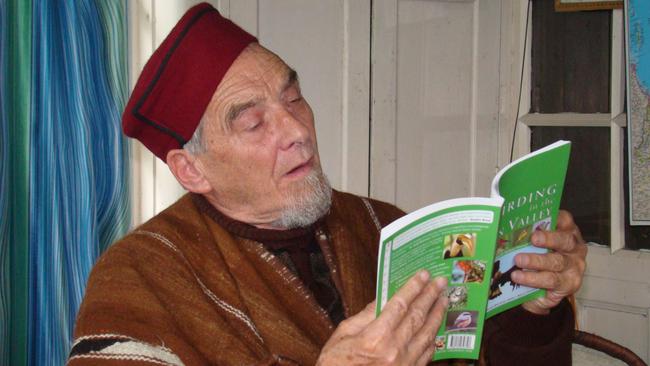An original hippie who lost in love, Bill Aitken then hit the road before settling in India
Bill Aitken was a freewheeling author, mystic, hitchhiker and hippie world wanderer who settled in India and brushed his teeth with soot.

One evening in 1959 Bill Aitken, a comparative religion graduate, was jilted by the woman with whom he was in love. The next day he sailed from Dover to fulfil a long-held dream of hitchhiking around the world. With £50 (about $2000 in today’s money), he discovered “shoelace travelling has the bonus of exposing the adventurous soul to the hand of providence”.
Of the thousands of kilometres he covered on the route later known as the “hippie trail”, just 16km were hiked. The rest were hitched by “an astounding assortment of transport that included lifts by a Danish scooterist, an Austrian TV salesman, a Greek melon transporter, an American oil rig team in Turkey, a police Jeep in Jordan, a petrol tanker in Iran and an Australian tour bus in Lahore”.
He wore a kilt as far as Istanbul, “a good gimmick for getting a lift”, but then posted it home: “It was so bloody hot.” On a detour to the Holy Land he found the hatred “so palpable you could cut it with a knife”. This was his baptism into the realities of the so-called living religions, which he had spent six years studying.
“Like St Paul, the scales were removed from my eyes,” he wrote, adding that the Himalayas turned out to be far holier than the Holy Land.
Arriving in Kolkata with two rupees, he needed a job to pay his freighter passage to Penang. He had the address of a wealthy Scottish businessman who “took one look at me, gave me 200 rupees and said: ‘Buy a jacket’.” Armed with the address of a retired colonel living in the Himalayas, they set off to explore. Before long he realised there was no need to resume his round-the-world travels “when what I’m looking for appears to be in India”.
A breakthrough in understanding Indian culture came in Prayagraj, when he accompanied the printer he was staying with for a morning dip in the Ganges. Aitken hesitated, but the printer told him: “It’s not the water that’s filthy, it’s the dirt.” He jumped in “and from that moment I’ve never had typhoid or those things”, he said. The Indian way of thinking, he explained, was that “if you get a bug, it’s for a purpose”, adding: “It’s easier to live that way too.”
Aitken wrote for several Indian newspapers and magazines using his middle names, Liam McKay. Meanwhile, the dozen books in his own name were characterised by a freewheeling description of his travels interspersed with intimate details of the land and its people.
One reviewer told how each was “filled with the brio of an adventurer but with the sensibility of a hermit”.
For Seven Sacred Rivers (1992), an extraordinary portrait of India, he followed the main rivers from Himalayan glaciers to foothill towns. Its sequel, The Nanda Devi Affair (1994), is a love letter to the “essentially royal and feminine” mountain of Nanda Devi punctuated with acerbic asides on bumptious bureaucrats.
While researching he was dismayed to learn a joint CIA-Indian operation to spy on China in 1965 had lost a plutonium generator on the mountain that has never been found.
His final book, Sri Sathya Sai Baba: A Life in 2006, is a reflective biography of the “god-man” he followed but never idolised.
He would cross the country by train, sharing his berth with hookah-smoking farmers and saffron-robed mendicants. In 1999 he co-founded the Indian Steam Railway Society. “The railway gives you India like nothing else can,” he said.
Travels By a Lesser Line (1993) is a nostalgic account of his train journeys through India, after which came Exploring Indian Railways (1994) and Branch Line to Eternity (2001): “I came to India to study comparative religion, but I found comparative railways much more interesting,” he quipped.
Fifty years after his emotional departure from Dover, Aitken was reunited with the ex-girlfriend who had broken his heart. He explained how his guru told him that he had left Britain because of his love for her: “She laughed and said ‘bullshit’!” He stayed in India, he said, because “the idiots you find in India are more to my liking than the idiots you find in England”.
In old age Aitken, who took Indian citizenship in 1972, remained agile intellectually and physically, his blue eyes and grey hair as intense as ever. Twice a day he undertook a 5km walk. One of his last visits to Britain was in 1997. “I just quailed about the sheer pace of life there,” he said
Bill Aitken, author. Born Clackmannanshire, Scotland, May 31, 1934. Died Dehradun, India, April 16, aged 90.
The Times



To join the conversation, please log in. Don't have an account? Register
Join the conversation, you are commenting as Logout